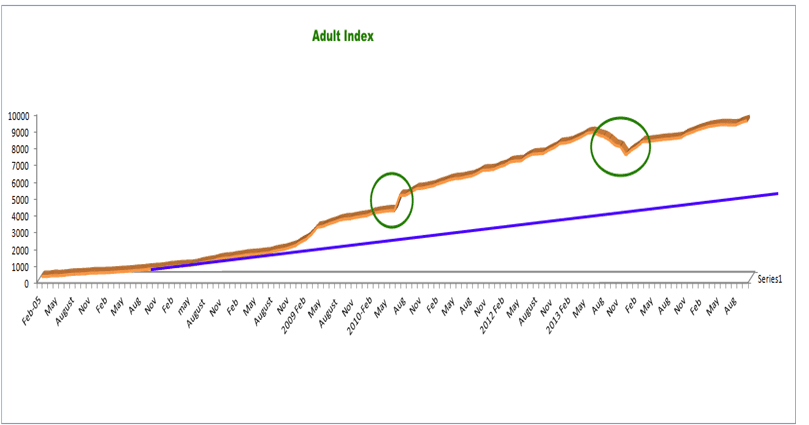The Rise of Sexual Immorality
Updated Nov 4, 2024
We will embark on this journey with a historical backdrop, a tapestry of time that vividly illustrates the significance of heeding history’s lessons. What becomes undeniably clear in this retrospective is the escalating concern of sexual immorality, a challenge that has grown increasingly pronounced over the ages.
Between 2005 and 2006, the index only showed a slight increase, from 201 to 330, significantly smaller than the current reading of over 9000. This sharp rise suggests that most people now see behaviour once deemed immoral in the late 90s and early 2000s as almost usual. This trend shows no signs of slowing down, indicating that bad behaviour in all areas of life is likely to increase.
The index also has a remarkable track record in predicting the moral decay of society. As mentioned above, it has only experienced two minor setbacks and continues to reach new highs yearly. This indicates that we have come to a point where human life is viewed merely as data entered into a computer database, with the individual no longer holding any significant value. The goal is profit; anything necessary will be done to achieve it, not just by corporations but most individuals. Therefore, if you have a good friend, or even a few, cherish them, for they are more valuable and scarce than gold.
Broadening the Issues Beyond Sexual Immorality.
A recent report has revealed that many breads in the United States contain a cancer-causing compound. While this may seem like good news compared to the scandals likely to hit the media in the coming months and years, particularly in the US and Europe, it is still cause for concern.
Exercise caution when dining out and only purchase products that contain easily recognizable ingredients. When it comes to bread, simplicity is key, and products with more than three ingredients are best avoided. Remember, questionable food items should end up in the rubbish bin rather than in your stomach.
In addition, the sex industry will likely continue to grow in popularity. It may soon be viewed as a commodity. Although Craigslist banned its adult section, Backpage.com emerged as a replacement, making Craigslist’s previous section seem tame.
While Backpage.com has since been shut down, other websites have emerged to fill the void. History has shown that making something illegal only increases the demand for it, and this is likely to apply to the sex industry as well.
Rethinking Relationships: The Role of Marriage Contracts in Modern Sexual Ethics
The concept of marriage contracts, or “marriage leases,” presents a groundbreaking approach to redefining relationships in our evolving society. These contracts offer flexibility and structure, allowing couples to adapt to changes and grow together while addressing essential aspects such as sexual ethics.
Marriage contracts propose a structured yet flexible framework that acknowledges the inevitability of change within personal relationships. Unlike traditional marriage vows that pledge “till death do us part,” these contracts allow periodic reassessments, catering to the contemporary values of personal development and autonomy. As per Dr. John Gottman, a renowned relationship expert, “Structured flexibility in marriage contracts can potentially reduce the emotional and psychological pressures associated with the permanence of traditional marriage, making room for more honest and adaptive relational dynamics.”
Incorporating sexual ethics into marriage contracts can profoundly impact a relationship’s health. These clauses foster mutual respect and consent, setting clear boundaries and expectations that prevent harmful dynamics. Dr Esther Perel, a therapist and author, emphasizes that “clearly defined guidelines on consent and boundaries within marriage contracts can lead to healthier sexual relationships by enhancing communication and ensuring mutual understanding and respect.”
While the benefits are notable, implementing marriage contracts is not without challenges. Relationships are complex and driven by emotions that might not neatly align with contractual stipulations. Moreover, the legal and emotional ramifications of entering and dissolving these contracts require careful consideration to ensure they are ethically sound and uphold the rights and well-being of all parties involved.
The introduction of marriage contracts could also catalyze discussions on other critical relationship aspects, such as domestic responsibilities, finances, and parenting. However, critics argue that this model might commodify relationships or foster a disposable attitude toward partners. Despite these concerns, the traditional marriage framework often falls short of meeting modern expectations, indicating a need for alternative models that reflect contemporary societal values and lifestyles.
Evolving Relationship Dynamics: The Intersection of Marriage Contracts, Sexual Ethics, and Societal Change
As societal norms and expectations around relationships continue to evolve, the traditional concept of marriage is being reexamined through the lens of personal autonomy and diverse relationship models. This shift reflects changing attitudes toward government and societal roles in personal relationships and a broader reevaluation of sexual morality and relationship dynamics.
Marriage contracts, or “wedleases,” offer a modern relationship approach that aligns with the contemporary values of flexibility and personal growth. These contracts allow couples to set specific terms for their union, accommodating the natural evolution of individual and joint aspirations over time. This model addresses the practicalities of relationship dynamics, including sexual ethics, by allowing partners to clearly define their boundaries and expectations. Experts like Dr. John Gottman suggest that such frameworks can reduce the pressures associated with lifelong commitments by fostering more honest and adaptive dynamics.
Addressing Sexual Ethics and Morality
Incorporating sexual ethics into marriage contracts can significantly enhance relationship health. By explicitly outlining consent and boundaries, these contracts encourage open communication and mutual respect, which are foundational to modern sexual morality. Dr. Esther Perel points out that this clarity is crucial in preventing harmful dynamics and promoting a respectful and fulfilling sexual relationship. Furthermore, these contracts can extend discussions to other vital aspects of relationships, such as domestic responsibilities and parenting, potentially reducing conflicts and misunderstandings.
While marriage contracts offer numerous benefits, they also present challenges. Critics argue that they may undermine the traditional concept of lifelong commitment and potentially foster a disposable attitude toward relationships. Moreover, the practical implementation of these contracts would require robust legal frameworks to address complex issues like child custody and property division.
The generational divide in perspectives on relationships is evident, with younger adults increasingly valuing autonomy over traditional marriage and parenthood models. Broader social changes, including gender role transformations and greater acceptance of diverse sexual orientations and identities, influence this shift.
The Future of Marriage: Trends and Transformations
As we move forward, engaging in open and respectful dialogues about the evolving nature of relationships and the role of institutions like marriage is crucial. Embracing a more inclusive and nuanced understanding of relationships can help create a society that respects individual autonomy, celebrates diversity, and fosters healthy, consensual, intimate connections.
As cultural norms and legal frameworks evolve, the institution of marriage is undergoing significant transformations. These changes reflect a shift towards more diverse and customizable relationship structures, influenced by a growing emphasis on individual autonomy and legal adaptability.
Embracing Diverse Relationship Structures
The future of marriage may see a broader acceptance of non-traditional relationship models such as consensual non-monogamy, polyamory, and other forms of partnership. These models challenge the conventional monogamous marriage framework and offer alternatives that cater to different needs and preferences, potentially gaining legal recognition and support.
Individuals increasingly seek customizable marriage agreements that reflect their unique circumstances and values. These might include agreements on the duration of the marriage, specific expectations around the relationship, and predefined financial arrangements. This trend towards personalization in marriage contracts allows for greater flexibility and reflects the diverse lifestyles of modern society.
Legal Adaptations for New Marriage Models
As new forms of relationships gain popularity, legal systems must evolve to address their complexities. This includes modifications in laws governing property division, parental rights, and inheritance to accommodate the dynamics of modern relationships. Such legal adaptations will ensure that all relationships are recognized and protected under the law.
Technology’s Role in Relationships
Advancements in technology are also shaping the future of relationships. Virtual relationships and marriages might become more prevalent, challenging traditional notions of physical proximity and opening up new possibilities for connection and partnership across distances.
The concept of “wedleases,” or time-limited marriage contracts, introduces a practical approach to marriage, allowing couples to define their terms of union, including its duration. This model offers a way to reassess and renew commitment periodically, which could appeal to those wary of lifelong commitments. However, it also raises concerns about the stability of family structures, especially for children, and the potential erosion of the traditional values associated with marriage.
Sexual Ethics and Commitment
With the introduction of concepts like wedleases, there is an ongoing debate about the impact on sexual ethics and commitment. Critics argue that such arrangements might lead to a decrease in commitment and a rise in sexual immorality as the binding nature of marriage is weakened. Proponents, however, see it as a realistic adaptation to contemporary relationship dynamics, where transparency and mutual agreement are prioritized.
As we look to the future, the concept of marriage continues to evolve, reflecting broader societal changes and the diverse needs of modern individuals. Whether through legal reforms, the adoption of new technologies, or the acceptance of customizable contracts, the institution of marriage is likely to continue adapting to suit the evolving landscape of human relationships better.
Exploring Alternative Relationship Models: From Wedleases to Ethical Non-Monogamy
The landscape of modern relationships is undergoing significant transformations, with individuals seeking more adaptable and personalized approaches to marriage and intimacy. This evolution has given rise to concepts such as “wedleases” and the exploration of ethical non-monogamy, each presenting unique advantages and challenges.
The Case for Wedleases
Lawyers have proposed the idea of “wedleases,” or short-term marriage contracts, as a practical solution to simplify the divorce process and reduce its emotional toll. Unlike traditional lifelong marriages, wedleases offer couples a predetermined duration for their union, after which they can renew or terminate the contract. This model addresses the complexities and challenges associated with permanent commitments, particularly in cases where relationships become unsustainable.
However, critics argue that the emotions of love and the messiness of breakups cannot be neatly contained within a contractual timeframe. The potential for mutual breakups remains low, and the absence of a deep level of commitment may lead to increased conflict and unhappiness. Additionally, wedleases could impact the stability of family structures, especially when children are involved.
Ethical Non-Monogamy: Benefits and Challenges
Alternative relationship models, such as consensual non-monogamy and polyamory, offer individuals the freedom to explore multiple intimate connections. These structures provide opportunities for personal growth, emotional development, and diverse support networks. They require high communication, negotiation, and consent levels, fostering improved emotional intelligence and self-awareness.
However, these models also present challenges. Navigating multiple relationships can trigger feelings of jealousy and insecurity, requiring careful management. Balancing time and energy across numerous commitments can be demanding, and these relationships often face social stigma and misunderstanding. Effective communication and boundary-setting are critical to success in ethical non-monogamy, ensuring that the needs and expectations of all involved parties are met.
Shaping the Future of Relationships
As society continues to evolve, the future of marriage and relationships may embrace a broader acceptance of diverse relationship structures. This includes legal adaptations to accommodate new forms of partnerships and a shift towards prioritizing individual autonomy and self-actualization within relationships. Technology will also play a significant role, potentially influencing the rise of virtual relationships and marriages.
Conclusion
Exploring alternative relationship models, including wedleases and ethical non-monogamy, reflects a broader societal shift towards customizable and adaptable approaches to intimacy. While these models offer benefits such as increased flexibility and personal growth, they also present challenges that must be carefully navigated. As we move forward, embracing open dialogue, respect for diverse choices, and a nuanced understanding of commitment will be essential in fostering healthy and fulfilling relationships.
Other articles of interest:
References
What is sexual immorality? Gotquestions.org
Sexual immorality on the rise The Telegraph
Sexual morality increasingly acceptable answeringeneis.org
Why sexual morality is on the rise Standard media
Americans’ acceptance of sexual morality growing Christian monitor
America’s moral meltdown tomorrowsworld.org














